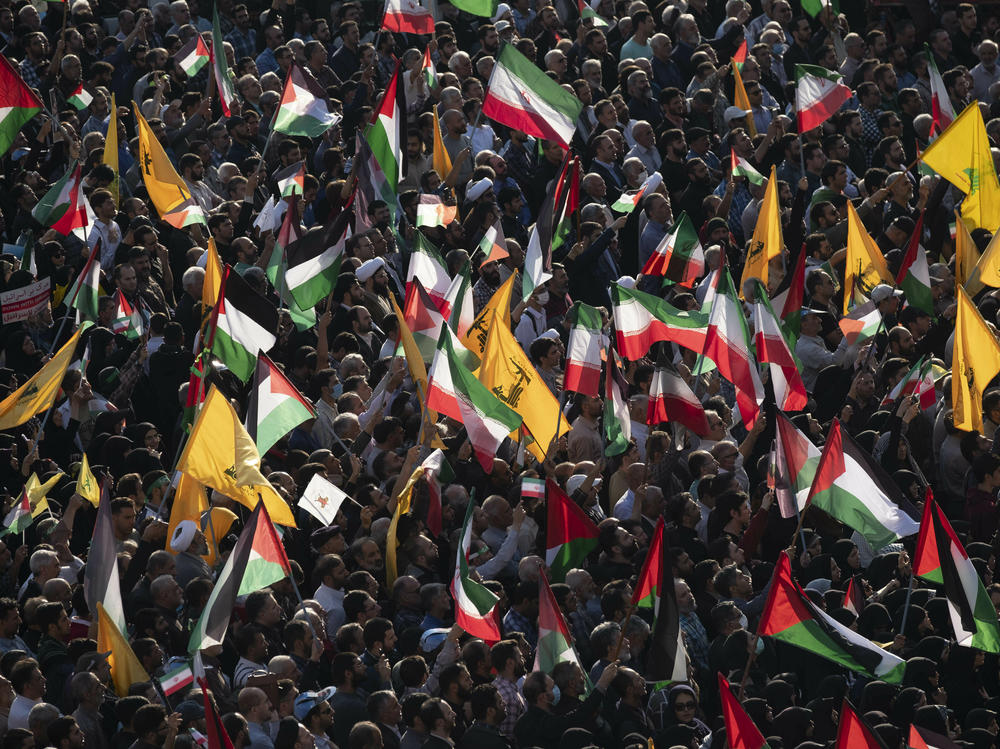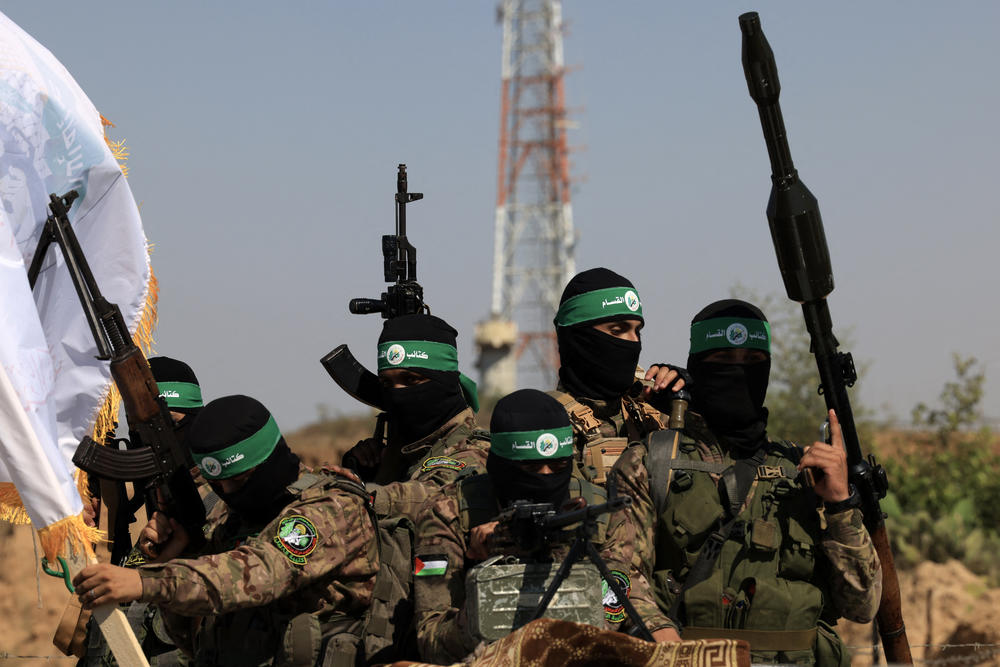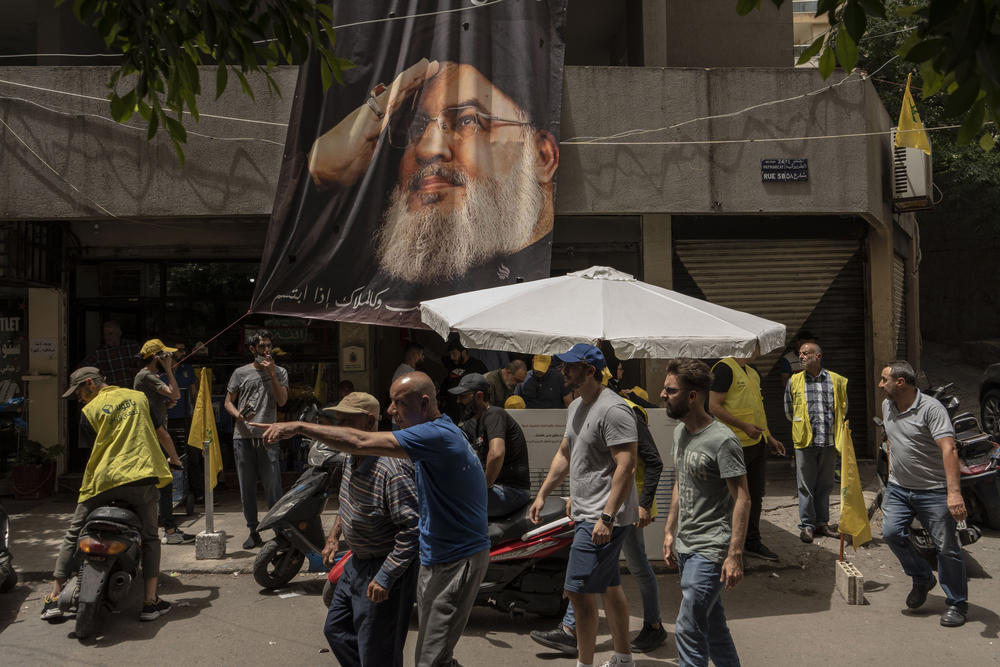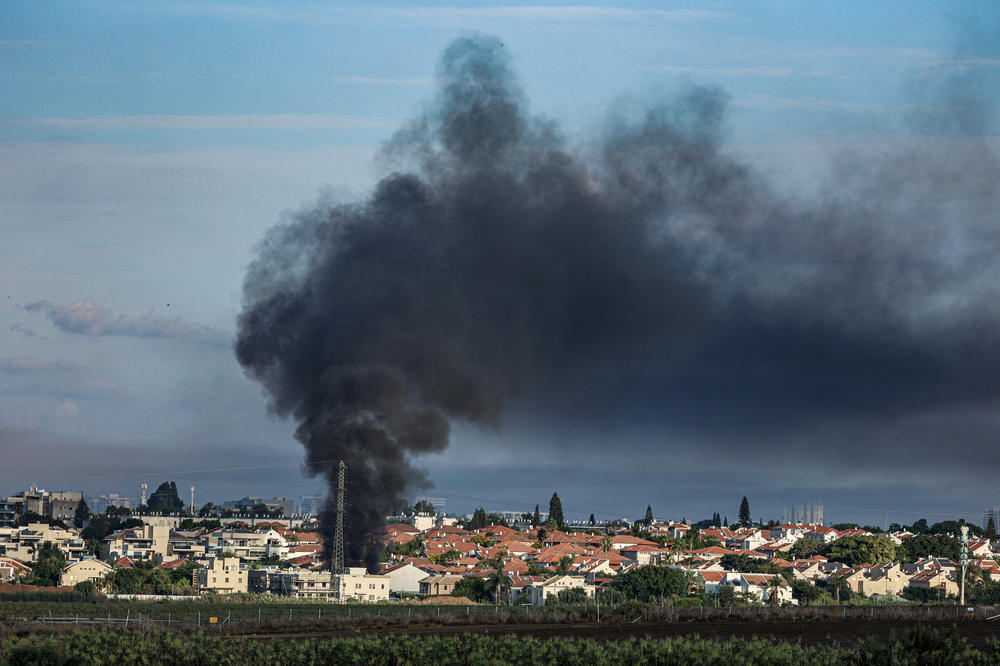Section Branding
Header Content
What is the 'axis of resistance' of Iran-backed groups in the Middle East?
Primary Content
LONDON — Secretary of State Antony Blinken issued a warning this week that the United States would act "swiftly and decisively" if it came under attack from Iran or its proxies in the Middle East, amid growing concerns of the Israel-Hamas war spreading.
His warning came as the White House accused Iran of facilitating attacks on U.S. military bases in Syria and Iraq in the last week. Questions about the extent of Iran's involvement in Hamas' Oct. 7 attack on Israel have shone a spotlight on Iranian influence in the Middle East and raised major concerns about the prospect of a wider war engulfing the region.
The U.S. has said there is no direct evidence that Iran was involved in the Hamas attack against Israel. However, analysts and regional experts say there are evident links between Iran and the attacks carried out by Hamas.
"Hamas and Iran have a long-standing but not always easy relationship," says Kim Ghattas, author of Black Wave, a book about the rivalry between Saudi Arabia and Iran. "Hamas gets funding and weapons from Iran. So whether or not it approved of the Oct. 7 attack, Iran is complicit."
Ali Barakeh, a senior Hamas official based in Lebanon, told NPR earlier this month that while "Iran knows that Hamas fights Israel and offers us support, which we do not deny ... we don't take orders from anyone."
What is the link between Iran and Hamas?
Hamas, a Sunni Islamist movement, is an autonomous Palestinian group with military and political wings. Hamas has ruled more than 2 million Palestinians in the Gaza Strip since 2007. Gaza has not had elections since Hamas seized power that same year from the Palestinian Authority, which rules the West Bank.
Hamas receives funding and weapons from Iran. The two have had rifts in the past, and do not always agree. Most recently, they fell out over Syria's civil war. Tehran withdrew funding from Hamas when the group chose to stand with protesters against Syria's leader Bashar Assad, whom Tehran supports. Hamas also has other backers, including Turkey.
What is the "axis of resistance"?
Hamas comes under the so-called "axis of resistance," a multi-pronged network of different forces across the region, supported to varying degrees by Iran.
The term "axis of resistance" is believed to have emerged in response to President George W. Bush's use of the term "axis of evil" — referring to Iran, Iraq and North Korea — in his 2002 State of the Union address. There are conflicting reports about who first coined the term, which is often used by Iranian officials.
The "axis of resistance" is an informal, loose-knit alliance that includes both Sunni and Shia Muslim groups and governments in Yemen, Syria, Lebanon, Gaza and Iraq, with differences and varying levels of proximity to one another and to Tehran.
The Iranian regime and its Quds Force, a subset of the Iranian Revolutionary Guard corps, have grown this network more on the basis of shared resistance to Western powers and Israel.
The axis includes the Lebanese militant group and Shia political party Hezbollah, the Syrian regime and Shia militias in Syria, which Tehran has built up and trained.
Yemen's Houthi rebels also come under the axis. The Houthis have fought a civil war against Yemen's government — which is backed by Saudi Arabia — for nearly a decade. The Pentagon said last week it had shot down missiles from Yemen that were potentially headed for Israel.
The axis also comprises militias in the influential Iran-backed Popular Mobilization Forces in Iraq, which were formed to help fight ISIS in 2014.
In Lebanon, Iran-backed Hezbollah operates both as a Shia Muslim political party and militant group. Hezbollah wields significant power, especially in southern Lebanon, and is active along Israel's northern border, where tensions have been building since the Oct. 7 attacks.
Each axis group has a different relationship with Iran. They also have differences with one another. In Gaza, both Hamas and Palestinian Islamic Jihad — a smaller, rival militant group that does not engage in the political process — are considered part of the alliance. Unlike Hamas, however, the PIJ receives most of its budget from the Islamic Republic.
"It is important to remember that Hamas is not a proxy of Iran in the way that Hezbollah is," says Ghattas, who is also a distinguished fellow at the Columbia Institute of Global Politics and spent two decades covering the region as a journalist for the BBC and the Financial Times.
"Hezbollah has become an extension of [the] Iranian Revolutionary Guards Quds Force," Ghattas says. "Hamas keeps its own separate identity and it has other backers, aside from Iran."
But despite their differences, Ghattas says, their interests often converge, as is the case this month.
"Their agendas still align in an anti-American, anti-Israel worldview, and they come together again when necessary," Ghattas says.
"Unity of fronts" and more coordination between Iran-backed groups
According to reports in the international media, Hezbollah leader Hassan Nasrallah met senior officials from Hamas in Beirut Wednesday to discuss the situation in the Middle East. A statement following the meeting said their goal was to achieve "a real victory for the resistance in Gaza and Palestine" and halt Israel's "treacherous and brutal aggression against our oppressed and steadfast people in Gaza and the West Bank."
Earlier this year, Nasrallah began referring to a "unity of fronts." The idea was that these disparate groups — all benefiting from Iran's support — would coordinate in their opposition to Israel.
Experts say there has been more cross-border coordination between these groups in recent years, even before Nasrallah specifically called for this.
"Over the past couple of years, Iran has been working to coordinate its proxies in what it describes as a 'unification of fronts,' surrounding Israel on all fronts," says Ghattas. "It is a more logistically coordinated operation, rather than each group doing its own thing."
This includes Hezbollah in Lebanon and other, less direct proxies, like Hamas in Gaza, Ghattas says.
Paul Salem, president of the Middle East Institute in Washington, told NPR's Ailsa Chang, "It's quite likely that Hezbollah knew of the preplanning [for the Oct. 7 attacks] and probably participated in training and planning with Hamas, and all of them sort of are part of this Iranian proxy force deployment that you have in Lebanon, in Syria, in Yemen, in Iraq and in Gaza as well."
How the Iran-backed alliance might influence the war
Mohanad Hage Ali, a Beirut-based senior fellow at the Carnegie Middle East Center, told NPR's Scott Simon that the "unity of fronts" of Iranian-backed proxy groups is "a kind of NATO for militant groups" in the region, requiring allied organizations to step in and provide military support should any other member groups face an existential threat.
"I would suppose that Hezbollah would find it difficult not to intervene, although it remains a challenge given the cost of the conflict and what it means for Lebanon," Hage Ali told NPR.
And preventing a broader war consuming the region similarly requires coordination and tight control over the battlefield, Ghattas says.
"More cross-border coordination allows the Iranians to tightly control escalation and deescalation," she says.
Copyright 2023 NPR. To see more, visit https://www.npr.org.




